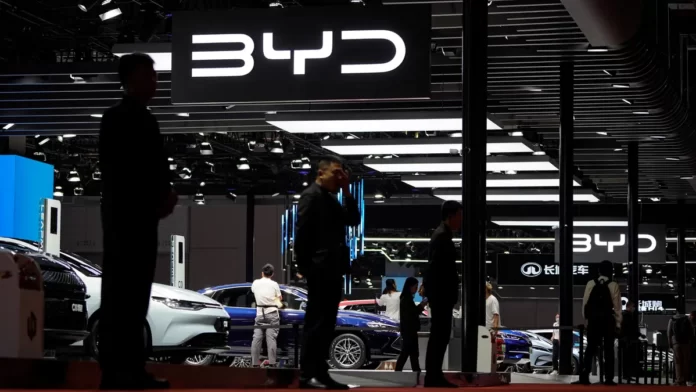Shares in Chinese automakers tumbled Monday after electric vehicle giant BYD rolled out new price cuts on more than 20 models, and the CEO of Great Wall Motor issued a stark warning about the financial health of China’s auto industry.
BYD Co. Ltd. shares listed in Hong Kong fell 8.6%, while Geely Auto dropped 9.5%. Shares in EV startups Nio and Leapmotor also declined, closing between 3% and 8.5% lower.
The selloff came as BYD, China’s leading electric vehicle manufacturer, announced a new round of incentives over the weekend, slashing prices and offering features such as smart assisted driving for free. The company’s lowest-priced model, the all-electric Seagull hatchback, now starts at 55,800 yuan ($7,765), after trade-in subsidies, according to a customer service representative.
Geely quickly followed suit on Monday, launching similar incentives in an effort to stay competitive in a market increasingly defined by aggressive pricing.
The moves underscore the ongoing price war gripping the world’s largest auto market, where automakers are under pressure to offer more value to attract buyers. The battle has been especially intense in the electric vehicle segment, where fierce competition and oversupply are pushing down margins and straining suppliers.
Adding to concerns, Great Wall Motor Chairman Wei Jianjun warned on Friday that China’s auto sector could be heading for a crisis similar to the one that hit property giant Evergrande, which defaulted on massive debts and triggered broader market turmoil.
“Now, Evergrande in the automobile industry already exists, but it has not collapsed,” Wei said in an interview with Sina Finance. While he did not name any companies, Wei accused major automakers of prioritizing stock market performance over sustainable growth and warned that the industry’s losses were becoming unsustainable.
Wei criticized automakers for undercutting suppliers with aggressive pricing, delayed payments, and quality compromises.
“Some products have been reduced from 220,000 yuan to 120,000 yuan in the past few years. What kind of industrial product can be reduced by 100,000 yuan and still guarantee quality? This is absolutely impossible,” he said.
His comments come just days after China’s state economic planner cautioned against “excessive competition” in some industries, including automotive, and hinted at possible regulatory intervention. The agency said some companies were even selling vehicles below cost, which disrupts market fairness and threatens long-term stability.
Industry analysts say the escalating price war and weakening consumer demand are raising red flags in a sector once seen as a bright spot in China’s economy. As competition heats up and profits shrink, the sustainability of the current growth model for Chinese EV makers is being called into question.




